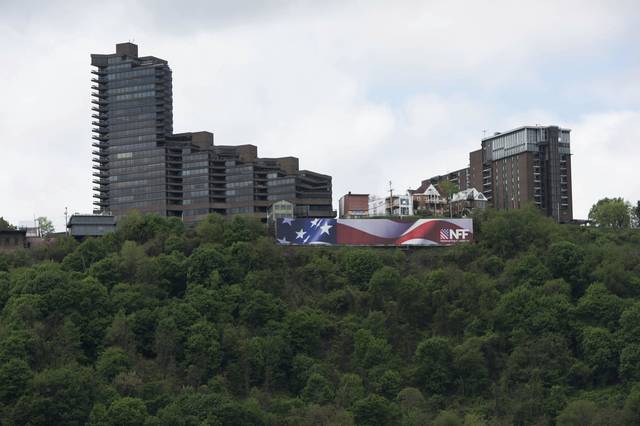https://triblive.com/local/pittsburgh-allegheny/pittsburgh-appeals-mt-washington-billboard-ruling-to-state-supreme-court/
Pittsburgh appeals Mt. Washington billboard ruling to state Supreme Court

Pittsburgh contends Pennsylvania’s Commonwealth Court erred in upholding a ruling that a controversial sign atop Mt. Washington owned by Lamar Advertising can remain.
The city has appealed the ruling to the state Supreme Court, arguing that Commonwealth Court contradicted previous case law involving Lamar signs in Monroeville and violated a Supreme Court precedent by substituting its own facts for those established by the Pittsburgh Zoning Board of Appeals.
The Supreme Court can accept or refuse to hear the appeal.
Attorney Jonathan Kamin, who represents Lamar, said the company is confident the court will affirm the lower court decision.
“This has gone to court four times now and the city has lost all four times,” he said. “We’re disappointed that they’re continuing to fight as we were hopeful to be able to move forward.”
Dan Gilman, Mayor Bill Peduto’s chief of staff, on Wednesday declined comment.
“Only by ignoring this court’s decision in Lamar v. Monroeville — and the distinction between electronic signs and static, vinyl signs — was the panel in Lamar v Pittsburgh able to reach its conclusion,” the city wrote in the appeal.
The city and Lamar have battled in court for years over the landmark billboard that has featured advertising since the 1920s for such local brands as Iron City Beer, Bayer and Alcoa.
Pittsburgh contends the billboard has violated city zoning regulations since 2016 when Lamar placed a vinyl sign for Sprint on top of existing neon lettering. The sign currently features advertising for the National Flag Foundation.
Lamar alleges the city violated its due process, property and free speech rights by preventing the company from modernizing the billboard with LED lighting.
An Allegheny County judge last year ruled that the Pittsburgh Zoning Board of Adjustment erred when it ordered Lamar to remove the sign. Pittsburgh appealed to Commonwealth Court, and a three-judge panel in August upheld the county court ruling.
Commonwealth Court in October refused Pittsburgh’s request for the entire court to consider the issue.
In the 2007 Monroeville case, Lamar wanted to replace 17 existing conventional billboards in the municipality with signs featuring LED lighting. Pittsburgh contends the two cases are the same and that Commonwealth Court ruled against Lamar in the Monroeville case.
The court determined that “the proposed change to Lamar’s billboards from a conventional signage to an LED-type signage constitutes an alteration of a structure which requires a zoning permit along with a site plan and conditional use approval in accordance with the zoning ordinance,” according to the city’s appeal.
Pittsburgh also argued that Commonwealth Court substituted its own findings for those of the zoning board regarding the size of advertising content on the sign. The city contends judges were bound by a Supreme Court precedent to determine only whether the zoning board “committed an abuse of discretion or an error of law.”
Copyright ©2026— Trib Total Media, LLC (TribLIVE.com)
